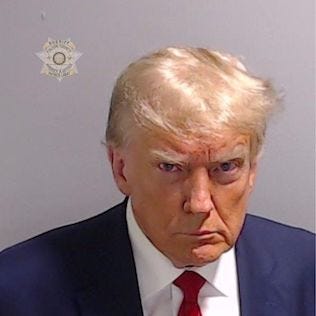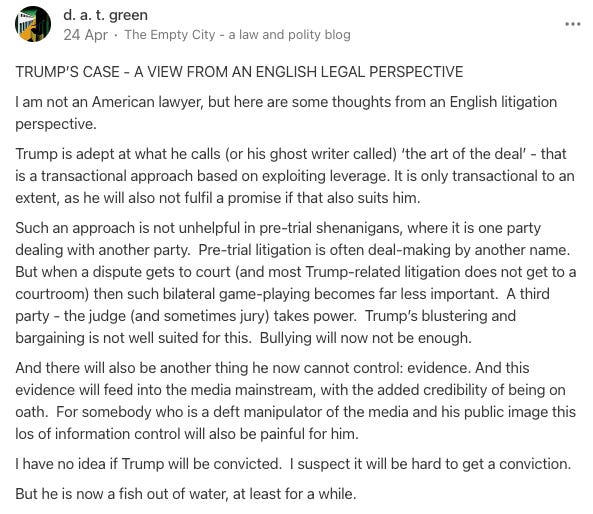Donald Trump is convicted
But it is now the judicial system that may need a good defence strategy
On balance, the prosecution of Donald Trump in New York did not look likely to succeed.
The prosecution had to show that certain business records were falsified at the direction of or on behalf of the defendant, and falsified for a further unlawful purpose.
That was a lot for a prosecution to prove - especially when there is no documentary admission that the defendant said “I direct that these records be falsified” and “I also direct that those records should be falsified for this ulterior wrongful purpose”.
What made such a prosecution even more difficult was that a key prosecution witness was a self-confessed liar with a self-confessed grudge.
And what made such a prosecution even more difficult than that is that the jury verdict had to be unanimous.
Regardless of the celebrity - or notoriety - of the the defendant in this particular case, these general features made this look like an ambitious prosecution.
But.
The prosecution pulled it off.
The prosecution were able to satisfy the unanimous jury that the records were falsified at the direction of or on behalf of Trump for the unlawful purpose of affecting an election. The prosecution was able to corroborate the evidence of its key witness.
Overall, and again regardless of the identity of the defendant, it was an impressive piece of lawyering.
And as Joel Taylor remarked on Twitter, it was also an impressive piece of jurying.
*
Yet it must be said that it was an unimpressive piece of defending.
Of course, Trump had the right - indeed, as an American, a constitutional right - not to give evidence.
And, of course, it was open to the defence to test the prosecution case without putting forward a positive account of the facts - especially in an elaborate and complicated case like this.
But one gained a sense in this case that a wiser defendant would have allowed the defence to adopt a different approach.
Yes: Michael Cohen, the self confessed liar and grudge holder, could be attacked in respect of his credibility.
But when the prosecution has been careful to corroborate almost all the material points in his evidence, then attacking Cohen’s credibility may not be sufficient.
The defence strategy here was not hopeless - it could have worked had the jury become preoccupied with Cohen - but it was a risky one to adopt.
The defence really had to put forward an overall positive explanation for the sequence of documented communications, authorisations and payments that the prosecution put before the jury - an explanation more plausible (and lawful) than the (unlawful) explanation advanced by the prosecution.
An explanation that would, in essence, raise reasonable doubts that that the prosecution version of events would be the true one.
And it appears that the defence did not do so, leaving the jury with only one explanation that covered the mass of documentation that fraudulent records were created to disguise unlawful payments: the prosecution’s explanation.
Trump and his lawyers wanted to tell the story of a corrupt prosecution and a dishonest witness, but the story they really needed instead to tell was that which explained the entirety of the evidence before the jury.
They ended up telling the wrong story.
*
Previously this Substack has pointed out that a court hearing - a trial - is where Trump is a fish out of the water:
What works for Trump in one, well-versed context does not work for him in another.
One can see why, among other reasons, he wants to put off the other court cases as long as possible, even if he can weaponise them for fund-raising and campaigning. Trials are a thing he cannot dominate by his usual strength of will and cunning alone.
(This also may be related to his aversion, when in office, of committing troops to combat situations - another means by which he would lose control of events and narratives.)
*
Because Trump cannot win in court, he has to win outside of court.
Just like because he did not win the last presidential election, he has to win outside of the electoral college.
And he does this, of course, by discrediting the process - by attacking the very legitimacy of institutions.
This hyper-partisanship regarding “stolen” elections and “corrupt” courts is dangerous.
Legitimacy can be fragile, and if the legitimacy of democratic and judicial processes is undermined then a polity will quickly become unhappy and fractured.
For if people do not believe in the legitimacy of democratic and judicial processes then they will tend to find other, less peaceful ways of addressing their political concerns.
And this is where the political and judicial systems themselves need to mount a plausible defence.
Trump may not be the master inside a courtroom, but he is a formidable and politically lethal operator outside the courtroom.
As always, it is not enough for justice to be done, justice needs to be shown to be done.
Trump and his supporters are now mounting an outright attack on the legitimacy of political and judicial institutions.
It may not only be Trump that needs a good defence strategy.





